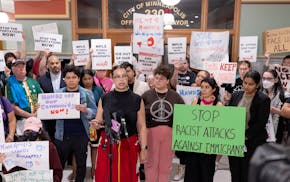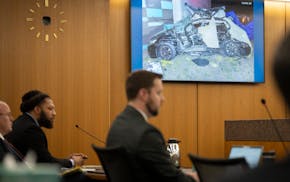Federal immigration authorities arrested a 29-year-old Ecuadorian in Minneapolis last year who'd been convicted of criminal sexual conduct with a victim under 13. Also nabbed in the national sweep of noncitizen sex offenders was a 41-year-old Eritrean national in Maplewood convicted of criminal sexual conduct involving multiple acts with an underage victim.
They were two among 1,255 immigrants with criminal convictions that the St. Paul office of Immigration and Customs Enforcement (ICE) swept up in 2024. But it's also less than half the amount of criminally convicted noncitizens arrested in Minnesota five years earlier, during the first term of President Donald Trump. As he prepares to take office again Monday on a promise to carry out "the largest deportation of criminals in American history," immigrants, their families, their supporters and detractors are bracing for those numbers to skyrocket.
"We don't know what exactly to expect," said Lindsey Greising, policy counsel at the Advocates for Human Rights. The group, she said, is "getting a lot of calls from people who are really concerned about what's happening, which is obviously really scary for a lot of communities."
Trump has muddied expectations by simultaneously talking about carrying out unprecedented deportations of all undocumented people. The vast majority don't have criminal records, though, and experts question how far the new Republican administration can realistically go without a massive addition of resources and what they fear would involve widespread violations of civil rights.
"You have no choice," Trump said last month on NBC. "First of all, they're costing us a fortune. But we're starting with the criminals, and we've got to do it. And then we're starting with others and we're going to see how it goes."
As the second Trump term approached, noncitizens scrambled to connect with attorneys and attend "know your rights" seminars. Advocates assembled rapid-response teams in preparation for an immigration crackdown likely unprecedented in U.S. history.
How it will play out is hard to forecast. In Minnesota, just 214 people are in ICE detention, with 60% having current or pending criminal convictions. But the state has an estimated 81,000 undocumented residents overall. Another 42,000 people, many of whom crossed the border without legal permission, are temporarily protected from deportation in most cases while their proceedings go through the Fort Snelling immigration court.
Deportations dropped drastically in Minnesota during the last four years under President Joe Biden. The ICE office in St. Paul deported 5,013 immigrants under Biden, a dramatic reduction from the 11,775 deportations during Trump's first term. Immigrant detentions fell by half in Minnesota from 2019 to last year.
The Sherburne County jail, which once drew controversy for housing more than 300 ICE detainees under Trump, has just four. The majority of immigration detainees now reside in the Kandiyohi County jail in Willmar. About one-third are in the Freeborn County jail in Albert Lea.
Minnesota's limited detention space would not be an obstacle to the mass jailing of unauthorized residents, however: ICE can arrest immigrants here but send them to detention centers out of state.
The agency has deported Minnesota immigrants for a range of crimes. ICE sent Omer Abdi Mohamed back to Somalia in 2023 after he served a sentence in federal prison on a Minnesota conviction of conspiracy to provide material support to terrorists in his homeland. In the sex offender sweep last year, St. Paul immigration authorities — who oversee enforcement in Minnesota, the Dakotas, Iowa and Nebraska — arrested 15 noncitizens with sex offender convictions, mostly against children. Nationally, 275 sex offenders were arrested.
"All the individuals we apprehended during this operation are threats to our local communities," Peter B. Berg, St. Paul Field Office director for ICE's Enforcement and Removal Operation, said in a statement.
In recent years the St. Paul ICE office also deported a series of foreign fugitives wanted for violent crimes in their home countries. After arresting a man for driving without a license and other traffic violations, authorities learned he was wanted in Guatemala for homicide. ICE sent back a Venezuelan fugitive wanted for murder and removed an El Salvadoran wanted in his country for rape against a minor, extortion and affiliation with terrorists.
Another El Salvadoran fugitive in the Minneapolis area was deported after law enforcement learned he was wanted back home for charges connected to a 2014 attack on a police station that killed a mechanic and wounded officers. Such serious crimes are linked to a small fraction of immigrants here without legal permission, and studies show that undocumented immigrants commit less crime than American-born citizens.
Focusing on deporting criminals has been one way to deliver immigration enforcement against the constant challenge of limited federal resources.
The Obama administration laid out a policy of prioritizing removals of foreigners who had recently entered without legal permission or were deemed threats to national security and public safety. The Trump team rescinded the practice, instead considering all undocumented immigrants subject to deportation.
That created a sense of chaos, several immigration experts told the Minnesota Star Tribune, spurring fear across entire immigrant communities.
Logistical challenges were the biggest reason Trump was not able to carry out deportations on the larger scale he wanted, said University of Minnesota Law School Prof. Linus Chan, director of the Detainee Rights Clinic. While he doesn't discount that Trump could go further with deportations in his second term, Chan said there are many questions: "Where is the money going to come from, where are the [enforcement] people going to come from, what sort of resources? Are they really going to use the military? Are they really going to try to force every single state and local law enforcement agency to become immigration officials?"
The Biden administration restored a policy that gave prosecutors more discretion to deprioritize cases against longtime undocumented immigrants without criminal records. The idea was to free up resources for removing those who posed serious threats. Trump's message of focusing on deporting criminals has left some immigration experts questioning how that would be different from what happened under his predecessors.
Any noncitizen can be put in removal proceedings if they commit aggravated felonies or crimes involving what's deemed as "moral turpitude," a category that includes some DUI and domestic abuse cases.
Adriana Lopez, immigration project manager at the Minnesota Freedom Fund, said that during Trump's first term there were rapid-response teams of advocates, attorneys and nonprofits that coordinated to help immigrants when they learned of ICE raids. Those groups are coming together again and sharing information across states about what works and how to provide support. The Freedom Fund paid ICE detention bonds for 91 detainees last year in Minnesota and other states, Lopez said, with $10,000 a common amount.
"None of us exactly know what will come but we want to be able to build power with our community and not necessarily panic," Lopez said. She added: "We know this time is going to be hard and we know we need to collaborate in a group."
Unlike defendants in criminal court, people in immigration proceedings do not have a right to legal counsel if they cannot afford it. Adding to that issue, Minnesota has a shortage of immigration attorneys who can take on new clients.
Immigration courts have been backlogged for years, Greising noted, and have not been given the resources they need to process cases efficiently. The Biden administration's policy of creating deportation priorities was aimed at addressing that.
If Trump returns to a policy of trying to deport all undocumented people, Greising said, "that could create quite a lot of chaos and uncertainty, which adds to the backlog in the court." She speculated that could be part of the new administration's strategy: To argue the system is overwhelmed and completely overhaul it, removing rights in the process.
Chan said he believes there are people in the incoming administration who are aware of the logistical difficulties of mass deportations. And yet, he said, "they have staked their career and their reputation on making sure that we have the largest deportation in the history of the United States. So I don't know exactly how it's going to happen but I do think there are a lot of motivated people who want to see it happen."

How the federal raid unified the fractious Minneapolis City Council against Trump, sort of
Trump travel ban 'cruel,' Minnesota advocacy group says

Minneapolis City Council lowers street food cart license fee, hoping fruit sellers will hawk legally

No verdict after first day of jury deliberation in Derrick Thompson murder trial for crash that killed 5

